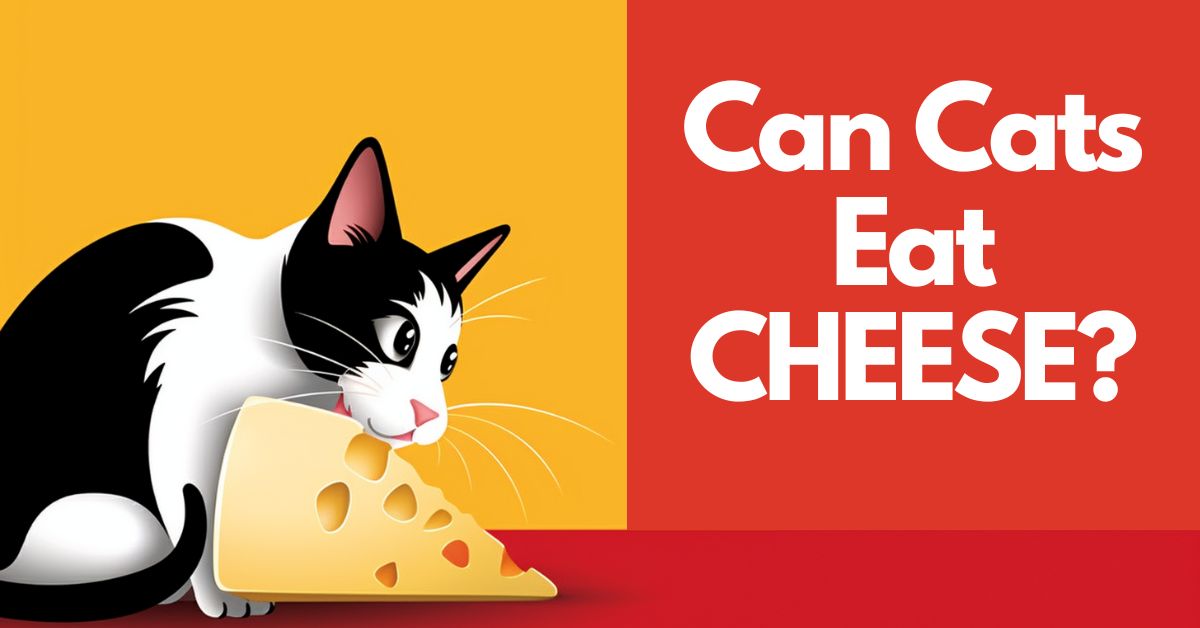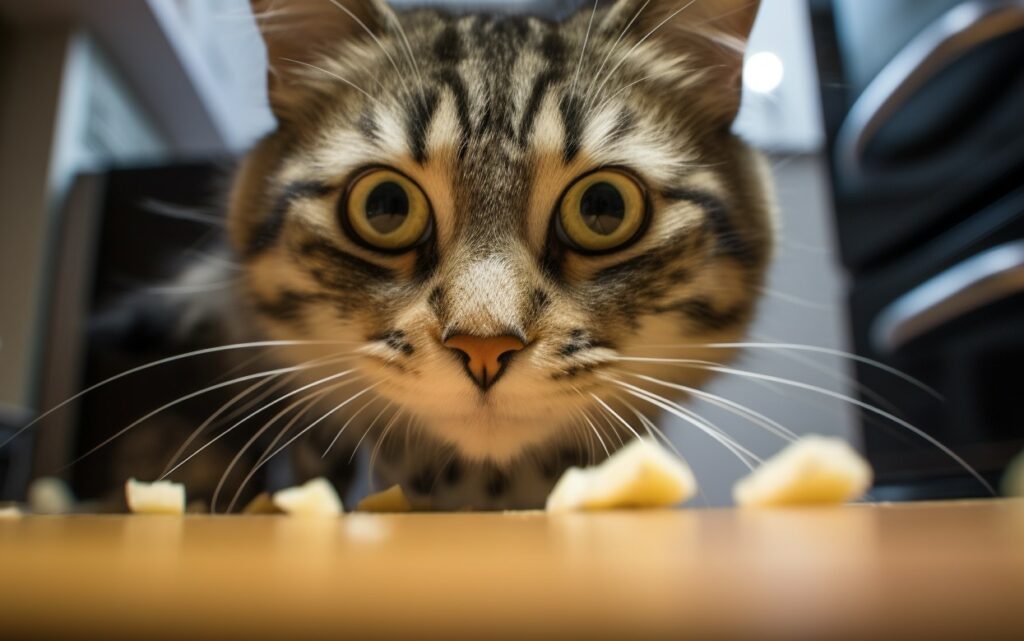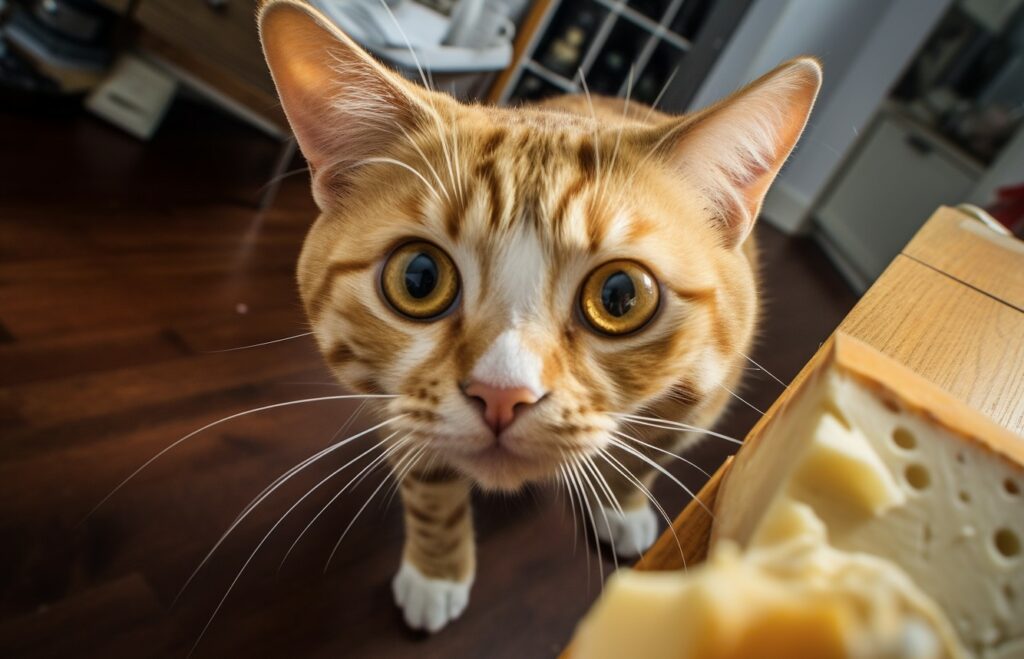
I feed my cat cheese, and he loves it, but am I doing the right thing?
As a pet nutritionist I wouldn’t recommend you feed your cat lots of cheese, for numerous reasons, but as the occasional treat your healthy cat or kitten should be absolutely fine – it may even be nutritionally beneficial.
That’s assuming it’s a healthy cheese, as many processed cheeses or mouldy cheese is a bad idea.
Let’s take a deep dive into the brie and find out what cheese is safe for cats to eat, and why:
Is cheese good for cats, and if so, why?
A natural feline diet, or diet of any carnivorous feline from domestic kitted to wild Sabre Tooth Tiger, is almost entirely protein and fat.
Your cat’s digestive system processes protein and fat far more efficiently than starch and carbohydrates. In fact, the short digestive tract of your feline means carbs and starches are not only unnatural for the species, they can wear down the kidneys and cause general ill health.
Makes you wonder why your cat food is so high in carbohydrates, doesn’t it?
Given cheese is protein and fat based, from an animal source, is a good sign cheese can be beneficial for your cat.
However, many cheeses may not be suitable for your cat. Namely processed cheeses or those high in sodium, but mouldy cheeses and those with other ingredients or additives should be avoided as well.
What types of cheese are safe for cats?
I like to put cheese into two distinct categories – processed cheese, and real cheese.
Like most things these days, processed products are hard to differentiate from real foods. The reason for this is very clever marketing, and labelling regulations having more holes than, well, Swiss cheese.

Some cheeses, processed cheese in particular, can be high in sodium. Cats can be sensitive to excessive salt intake, and this can lead to dehydration or kidney-related issues in the long term.
Lactose in some cheese may also prove a problem, especially given an estimated 50% of cats are believed to have difficulty with lactose. That said, many real cheeses are much lower in lactose and can be fine – more on this later.
Another issue with processed cheese is they may contain additives, preservatives, or artificial ingredients. These may be problematic or even harmful for your cat to consume.
Penicillium, a fungus found in mouldy cheese, can be toxic to cats.
Below are five cheese which should be safe for your cat, and five which should definitely be avoided:
Five cheeses which may be suitable for your cat
- Mozzarella – A good source of protein and calcium, and being lower in lactose than other cheeses means it should pose less dietary issues.
- Cheddar – Good ole cheddar, another lower lactose cheese full of protein and essential fatty acids.
- Swiss Cheese – Protein, moderate fat, and low lactose, the only part of Swiss Cheese your cat won’t enjoy are the holes.
- Provolone – This semi-hard mild cheese tends to be a winner with cats, and like other cheeses, a source of protein and fat.
- Parmesan – As an aged cheese parmesan is a good option for a cat, and may actually encourage your cat to eat other types of food if you sprinkle a little on top.
Babybel cheese is another contender for this list, which although containing salt, is a real Edam-style cheese.
Five cheeses you should avoid feeding your cat
- Processed cheese slices – I find these to be the worst culprits for additives, preservatives, and too much salt. Well and truly in the processed cheese bucket, you should avoid feeding cheese slices to your cat.
- Blue cheese, stilton, and other mouldy cheese – Always play it safe with mouldy cheese, and do not offer these to your cat. Mouldy cheese can contain penicillium, a fungus which can be toxic to our pets.
- Feta – A little feta likely won’t hurt, but keep in mind the relatively high salt content means this is not the best cheese to give your cat.
- Cheese spreads – Another type of processed cheese which varies in both quality and cheesiness (if that can be used as a scientific gauge). Cheese spreads can contain additives, preservatives, too much salt, or other unknowns which may cause your cat digestive issues.
- Any cheese with onion (or garlic) – Onion can be toxic to cats. Garlic can be toxic if fed in excess. Be wary of any cheese which contains other types of ingredient, especially if you don’t know they’re safe for your cat.
How much cheese should you feed a cat?
A cat needs a variety of nutrients in sufficient amounts, quite often in balance. Unless you’re a well versed feline nutritionist you shouldn’t risk your cat’s health.
As a rule of thumb, keep all treats within 5 to 10% of your cat’s diet, and keep cheese as only part of that amount.
Most digestive issues in cats occur because one foodstuff is fed in excess, or continuously over a period of time. Kibble included.
Keep in mind cheese isn’t the best treat for your cat, and any fresh or dried meat, organs, or raw meaty bones like chicken necks or wings may be a better and more nutritious treat for your cat.
But cheese, in small amounts, should be fine.
Can lactose-intolerant cats eat cheese?
Fascinatingly, yes.
Even though science suggests around half the cat population are lactose intolerant, many lactose-intolerant cats are fine with cheese.
Cheese, particularly proper cheese, is much lower in lactose than milk.

To add my opinion, there are reasons why so many cats become intolerant. Not just to lactose, but to many types of food – even meat they would naturally and instinctively hunt and eat. I see this as a problem with pet food in general, and as pet owners it’s worth considering why.
Cats are obligate carnivores, which means their diet should be based on animal foods. Cheese, and milk, are actually animal foods, so not far off a natural feline diet, although they wouldn’t hunt out cheese in the wild.
Cat food on the other hand, is mostly made of cereal grains or other alternative starches which cheaply bulk up a processed cat food and greatly increase profit margins.
If you consider most cat food isn’t species appropriate, and you feed that cat food every single day to your cat, then it’s easy to understand why our cats develop intolerances to many foods.
We’re the same.
If you ate cereal grains for many months, then had a piece of cheese or glass of milk, you may find you have the runs.
Did I say I also give my cat milk? Regular cows milk.
Over the past 13+ years, my little Sir Whisker McFluffybutt (aka Bernard) has lived off a wide range of animal foods, dairy products, kibble, wet, raw, BARF, and whatever else.
What he doesn’t have, and never has had, is highly processed food-coloured nuggets of wheat and cereal by-products labelled as a meaty diet for a carnivorous animal.
Oh, and despite 50%+ cats suffering dietary intolerances, and despite all the bad press about feeding cheese and other real foods to cats, my cat is still super healthy in his senior years.
How can you tell if your cat is intolerant of cheese?
Even if your cat has a stomach of steel from carbohydrate-based processed junk food for carnivores, you may find they get the runs right after eating some cheese.
Diarrhea is just one symptom of your cat being intolerant to cheese or other types of food, but the following symptoms are also common:
- Stomach pain (which we quite often miss)
- Vomiting and diarrhea
- Flatulence
- Lethargy or an unwillingness to enjoy life
- Itchy skin, hot spots, scratching
- Changes in behaviour and signs of stress or anxiety
Note these are short term symptoms. Long term feeding of anything which doesn’t agree with your cat can have more significant health impacts.
Keep in mind if you’ve never fed cheese to your cat, or other foods for that matter, it is to be expected they react to this as a newly introduced foodstuff.
Can cheese be used as a training treat for cats?
If your cat is fine with cheese, and shows excitement when you offer him a morsel, then yes cheese can be used as a training treat for your cat.
Not that you’d want to train your cat.
Not unless you have a lot of time on your hands.
If you’re like me and have no intention of training your insanely independent kitty to jump through hoops they don’t really want to jump through, just give them the odd bit of cheese as an occasional treat.
You’ve reached the end of what has proven a lengthy discussion, and to conclude, yes a cat can eat cheese.
Cheese can even be beneficial in moderation, assuming you feed healthy, appropriate, real cheese. Avoid processed cheese, mouldy cheese, and cheese with other potentially harmful ingredients.
If your cat shows any signs of intolerance with any cheese, like with other foods, then stop feeding it immediately.
Many cats are lactose-intolerant, which means higher lactose cheese may cause a number of reactions. Many cats become intolerant of many foods, from being fed one brand of processed food continuously since kittenhood. That doesn’t necessarily mean any newly introduced foods, like cheese, are bad for your cat – it means your cat can no longer handle such a food.
Many cats, however, love a little bit of cheese in the morning!
Does yours?






